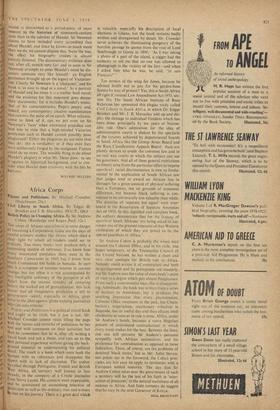Africa Corps
01,
Civil Liberty in South Africa. By Edgar H.
Brookes and J. B. Macaulay. (0.U.P.. 18s.) ltritiqh Policy in Changing Africa. By Sir Andrew
ohen. (Routledge and Kegan Paul, I 2s.) Till. corps of African specialists is in some danger of becoming a Corporation. Gone are the days of candid primary studies like Drum, which •shed a 'leer light by which all readers could see to iialuate. Too many books now produce only a contending sparkle of reference. You know how many nominated portfolios there were in the :Southern. Cameroons in 1947 but / know how much Continental Oil holds in Somalia. In part this is a symptom of intenser interest in current ,change, but too often it is not accompanied by ally intelligible summary of the prospects at all. Apart from the mental timidity of cowering before the wicked act of generalisation, this lack means that all imaginative prediction is left to government—which. especially in Africa, gives force to the jibes against 'globe-trotting journalists who can only criticise.'
Pagans and Politicians is a political travel book and ought to be vivid, but it just is not. Mr. Michael Crowder cannot resist filling the page With the names and remarks of politicians he has met and with comments on their activities, but then he remembers that he is, after all, writing a travel book and not a thesis, and cuts on to the
next personal experience without giving the back- ground essential to understanding his political detail. The result is a book which must bush the layman with its references and disappoint the ex Pert with its lack of discussion. The author travelled through Portuguese, French and British West Africa, all territory well known to him r already, in the company of a Creole journalist from Sierra Leone. His contacts were impeccable, and he questioned an astonishing selection of Politicians as well as the ordinary men and women he met on his journey. There is a great deal which
is valuable, especially his description of local elections in Ghana, but the book remains badly written and disorganised by detail. Mr. Crowder never achieves the illuminating pungency of the horrible passage he quotes from the visit of Lord Scarbrough to Goree in 1890: 'As I was taking a photo of a part of the island, a nigger had the audacity to tell me that no one was allowed to photograph in the vicinity of the fort—and when I asked him who he was, he said. "Je suis Francais!" ' Ten strokes of the whip for Jones, because he advised Smith not to pay for his garden-hose licence by way of protest? Yes, this is South Africa all right (Criminal Law Amendment Act 1953, sec- tion 2b); The South African Institute of Race Relations has sponsored this elegiac study called Civil Liberty in South Africa, in which Dr. Edgar Brookes and Mr. J. B. Macaulay add up and dis- play the damage to individual freedom which has been done, principally by ten years of Nation- alist rule. One's admiration for the idea of administrative courts is shaken by the spectacle of the tyranny achieved by departmental boards in South Africa like the Group Areas Board and the Race Classification Appeals Board : these are plainly devices to evade the common law and in no real way courts in which the subject can sue his governors. And all of these general restrictions on liberty arise from the particular effort to impose apartheid: racial discrimination is now so funda- mental to the application of South African law that judges tend to award an African less in damages for a given amount of physical suffering than a European, not on grounds of economic difference, but because black suffering is con- sidered to he intrinsically less valuable than white. The doctrine of 'separate but equal' went over- board in the Reservation of Separate Amenities Act of 1953. In this dignified and complete book, the authors demonstrate that for the fantasy of apartheid South Africans 'are being asked to sur- render one of the greatest treasures of that Western civilisation of which they are proud to be the special guardians in Africa.'
Sir Andrew Cohen is probably the wisest man around the Colonial Office, and in his exile, one hopes temporary, at the Trusteeship Council of the United Nations, he has written a short and very clear apologia for British rule in Africa. Nobody could accuse it of esotericism and both its arrangement and its perceptions are masterly. but Sir Andrew sees the value of everybody's point of view to a degree which gets almost Panglossian. From such a controversial man, this is disappoint- ing. Admittedly. the book was written from a series of lectures to Americans, but it produces the soothing impression that every phenomenon, Colonial Office meanness in the past. Joe Cham- berlain's imperialism, reactionary tribalism in Buganda, has its useful day and then effaces itself obediently as soon as its role is done. Africa. under Sir Andrew's hands, becomes a suave Hegelian process of assimilated contradictions in which every event makes for the best. Between the lines, one can still perceive Sir Andrew's personal sympathy with African nationalism, and his preference for centralisation as opposed to loose federalism. These, of course, are the problems of destined 'black states,' but as Mr. Adlai Steven- son points out in the foreword, the Cohen prin- ciples are less easy to apply to territories with a European settled minority. The day that Sir Andrew Cohen takes over the government of such a territory will be the test of his faith in 'inter- action of pressures,' in the natural usefulness of all motives in Africa. And faint rumours do suggest that he may be the next Governor Of Kenya.
NEAL ASCHERSON






































 Previous page
Previous page